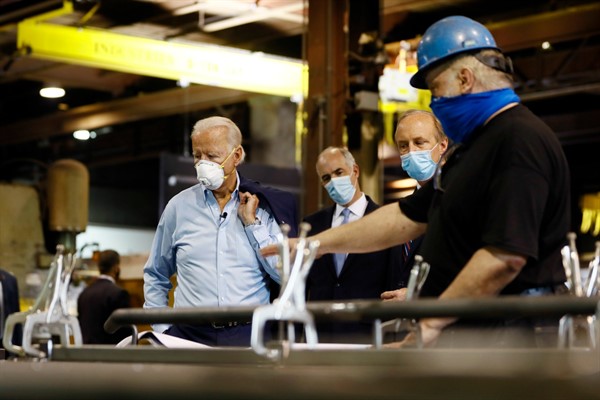Donald Trump has been an unorthodox president, to say the least. Much of America and the rest of the world is hoping for a return to some semblance of normality under President-elect Joe Biden. But what might that mean on trade? The traditional take on American trade politics for decades has been that Republicans tend to be free traders while Democrats are more skeptical. Trump certainly turned that on its head. Yet after he started imposing tariffs on hundreds of billions of dollars in imports, several polls—which obviously have to be taken with a grain of salt—showed most Americans becoming more supportive of trade and globalization. Biden has also been critical of Trump’s “America First” trade policy, especially the rejection of multilateralism, but the changes under his administration are likely to be more incremental than transformational.
During his decades in the Senate and as Barack Obama’s vice president, Biden behaved like a pretty traditional, centrist Democrat. His blue-collar roots in Scranton, Pennsylvania, did put him somewhat to the left of President Bill Clinton, who ushered the North American Free Trade Agreement through Congress, and China into the World Trade Organization. As a senator, Biden supported both of those moves, but he also voted against a number of bilateral free trade agreements negotiated by President George W. Bush’s administration. Biden shares the widespread concerns in Washington about the direction of China under Xi Jinping, but he also criticized Trump’s tariffs, correctly noting they are taxes on American consumers.
In addition to whatever innate caution Biden brings to trade policy, he also has to grapple with growing inequality and the perceptions among some that globalization is a major contributor to that. Astute observers of American policy and politics, including in this publication, have attributed America’s sharp divisions and Trump’s popularity—he just garnered more than 70 million votes—at least in part to concerns about the impact of trade and immigration. My fellow columnist Stewart Patrick, for example, wrote recently that by the time Trump ran for president four years ago, “many Americans had lost faith in globalization, given the slow recovery from the Great Recession, job losses due to competition from China and heavy immigration, both legal and illegal, that many saw as challenging America’s national identity.” That reality—plus the role that the Rust Belt states of Michigan, Pennsylvania and Wisconsin once again played in this election—could suggest a dim outlook for trade in a Biden administration as well.

